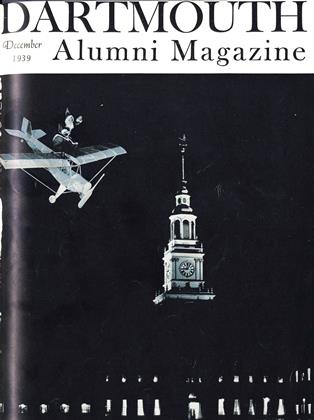TEN YEARS AGO this month, Dartmouth received an invitation to compete in the annual Harvard-Yale-Princeton Chess League Tournament in New York City. A team of four men went down from Hanover at the Christmas recess to match their wits and gambits with the chess stars of the Big Three. They didn't win, but a favorable impression was made, and the following year Dartmouth was voted a permanent member of this exclusive league. Each succeeding year, a quartet of Dartmouth's ablest chess devotees have competed in this little-publicized intercollegiate sport.
Chess has been played at Dartmouth since the days of Daniel Webster. Yellowed issues of The Dartmouth report club meeting and college tournaments off and on through the last century. But chess as an organized undergraduate activity died out in 1909.
In February, 1930, a new Dartmouth Chess Club was organized by a group of 25 students, and plans were formulated for an active program. Officers were elected, a distinctive pin approved, a properly-out-fitted room in Robinson Hall secured, and a college tournament started. The club was duly recognized by the College, placed under the supervision of the Council on Student Organizations, and a faculty advisor appointed. Dual matches were arranged with Harvard, Yale, Princeton, Columbia, West Point, the New Hampshire Chess and Checker Association, and the faculty. The team was selected from the finalists in the college tournament, and performed creditably in the dual matches—the high spot of the year being a clean sweep of six boards against the Cadets at West Point.
Since that first year, the club has struggled along with a minimum of backing or fanfare, but a full schedule of matches with other clubs and colleges has been successfully completed each year. However, the most important competition has always been the annual tournament of the Harvard-Yale-Princeton-Dartmouth Chess League in New York City during the Christmas vacation.
This tournament dates back to the nineties. Columbia was then a member of the League, but proved so superior to the other teams (by virtue of year-round participation in a city league) that Harvard, Yale and Princeton eventually withdrew. Columbia then joined forces with Penn, C. C. N. Y., and other local colleges as the Intercollegiate Chess League.
In 1925, a new foursome was started, with West Point joining the Big Three. However, after a short time the Cadets found they were unable to send a team, and the league was again reduced to three competitors until 1930 when Dartmouth was invited to participate. This league is supervised by a board of graduate representatives from the competing colleges. Dartmouth's representative has acted as Tournament Director in recent years. The players are four scholastically-eligible undergraduates from each college. They play a round-robin tournament with each of the other three teams. Each man who wins his game scores one point for the team. A draw rates a half-point. At the end of the tournament, the team having the highest number of points is the winner.
In the past ten years, Harvard has won a majority of the meets. Dartmouth, though sometimes second-high, has yet to win the handsome silver trophy. This year the meet will be held as usual at the Marshall Chess Club, 23 West 10th Street, played over a period of days just before Christmas. The referee, as in the past, will be Frank J. Marshall, longtime U. S. chess champion. Under the present team captain, Sidney Phillips '40, Dartmouth will again try its hand at the world's oldest game, in competition with our good friends and traditional rivals.
Graduate Representative.
 View Full Issue
View Full Issue
More From This Issue
-
 Sports
SportsBig Little Green Team
December 1939 By BILL CUNNINGHAM '19 -
 Article
ArticleHe Makes Students Think
December 1939 By HERBERT F. WEST '22, ERIC P. KELLY '06 -
 Article
ArticleA Landmark Is Gone
December 1939 By WILLIAM A. ROBINSON, Robert Lincoln O'brien '91 -
 Article
ArticleGRADUS AD PARNASSUM
December 1939 -
 Class Notes
Class Notes1931*
December 1939 By CHARLES S. MCALLISTER, CRAIG THORNE JR. -
 Sports
SportsBig Green Teams
December 1939 By Whitey Fuller '37









